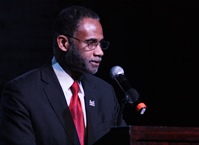
Dr. Baker implored those in attendance to become a voice by contacting local elected officials, asking local libraries or community centers to place posters about the importance of getting tested on bulletin boards or using their own social media accounts to spread the word, especially in metropolitan Detroit, where 65 percent of the state's residents with HIV live.
"We've come a long way since the fear and misunderstanding surrounding the early days of the identification of HIV/AIDS. Those advances came through research and education. With further efforts and greater education - and working together - we can continue to reduce the numbers of HIV/AIDS transmissions in Michigan so that one day we can think about this disease much the way we think about polio or smallpox," he said.
HIV/AIDS, while not confined to urban areas, "is a disease of disparity," said Michael Kaplan, chief executive officer at Washington, D.C.-based grant provider AIDS United and an honored guest of World AIDS Day Detroit. Kaplan was diagnosed with HIV in 1992.
His longtime partner, Detroit native Sean Sasser, graduated from high school less than a mile from the site of Tuesday's breakfast. Sasser also had the virus, and died from lung cancer in 2013 at age 44, an especially hard fight for someone HIV positive, Kaplan said. Sasser's relationship with the late Pedro Zamora of MTV's "The Real World: San Francisco" broke barriers when their commitment ceremony, a first for U.S. television, was featured on the show's third season. Zamora died in 1994.
Today, thanks to advancements in medical treatments, a 20-year-old who tests positive for HIV is expected to live to 75, only five years less than the uninfected. However, only 30 percent of Americans with HIV are virally-suppressed, meaning the virus can't be detected in their blood or is at a very low level because of anti-retroviral treatment, keeping patients healthier longer and reducing the chance of passing HIV on to others.
"We have the science. We have the tools. It's now just a question of community will and political will. We can get there, but it is going to take real action," Kaplan said.